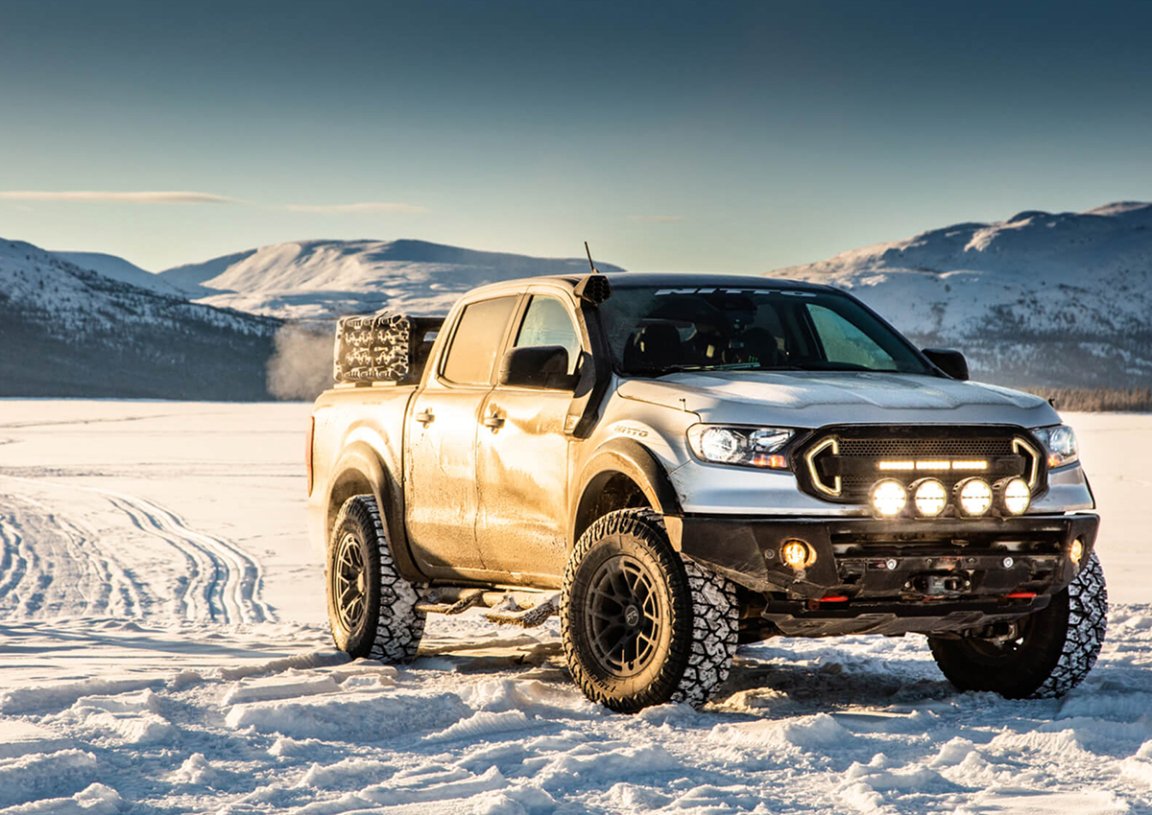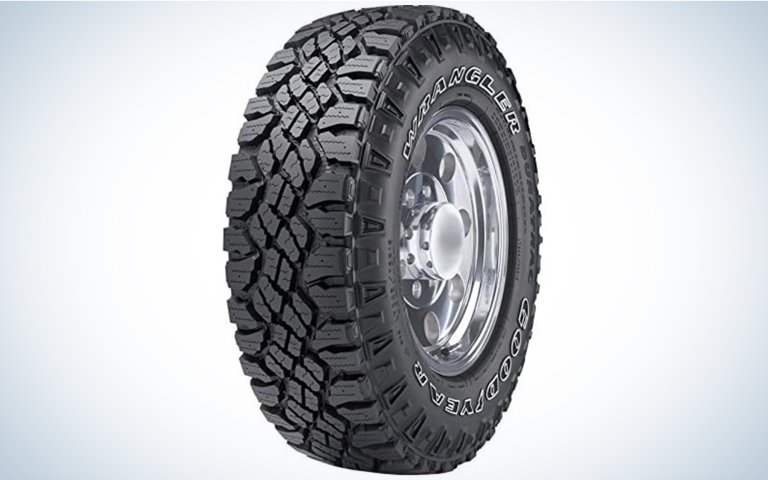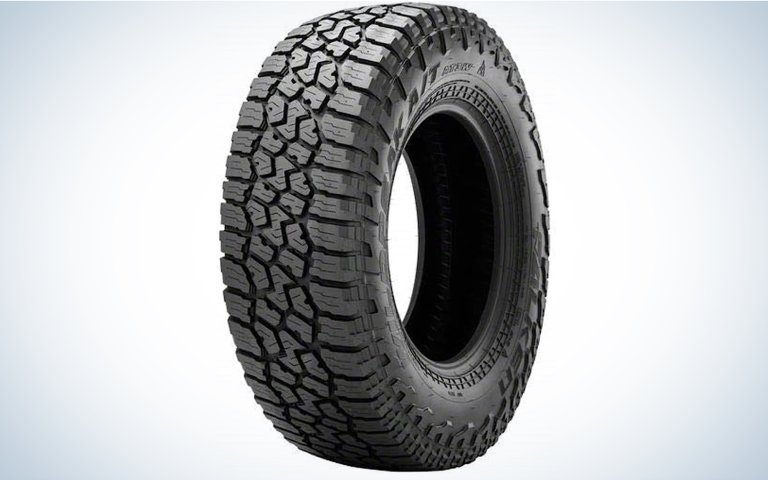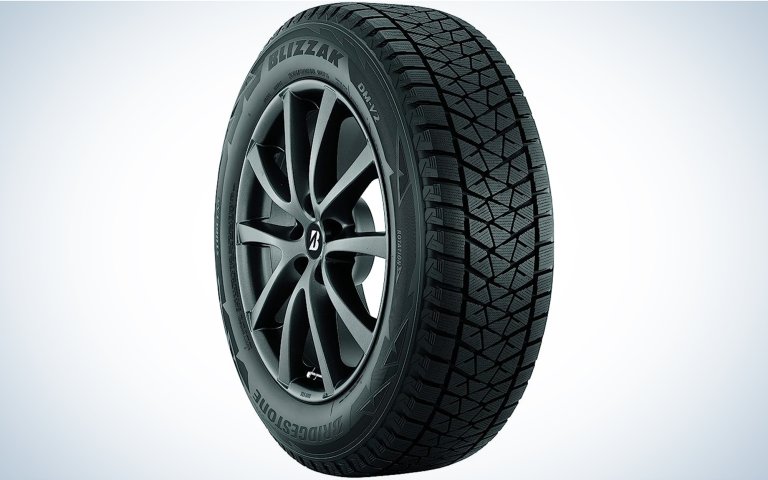We may earn revenue from the products available on this page and participate in affiliate programs. Learn More ›
The last snow we got this year was a doozy—about a foot of heavy snow that set up like cement in my driveway. With thoughts of spring, I poured a mug of coffee, wrapped myself in a coat, hat, and gloves, and laced up my trusty Converse sneakers. Sound crazy? It is. Obviously, I wore snow boots. But that’s essentially what a lot of people do every year when they trust all-terrain or all-season tires instead of snow tires for trucks.
I don’t blame you if you’re reluctant to open your wallet for another expensive set of truck tires. The good news is that many modern light truck tires are just as capable in the snow as they are on pavement, dirt, mud, or rocks. There’s no reason you can’t have it all—if you know where to look. The best snow tires for trucks can handle a wide variety of road conditions, and here are my top picks.
- Best Overall: Goodyear Wrangler Duratrac
- Best Budget: Falken Wildpeak A/T3W
- Best for Deep Snow: Interco Super Swamper IROK
- Best for Ice: Bridgestone Blizzak DM-V2
- Best for Towing: Nitto Exo Grappler
- Best for All Year: BFG All-Terrain T/A KO2
How I Chose the Best Snow Tires for Trucks
My criteria for snow tires are based on personal experience and industry research. I’ve spent most of my driving life in cold places like New Hampshire, Wisconsin, and the Sierra Nevada mountains so my own truck has seen plenty of snow tires. In cases where I don’t have personal experience with a tire, I dug into industry white papers, online reviews, and off-roading forums to get as much information as possible.
All but one of my picks carry the tire industry’s Three-Peak Mountain Snowflake rating. This means independent testing has verified that these tires can perform in extreme cold, snow, and ice. The only tire on this list that’s not 3PMSF-rated is an exception to the rule, and it’s here for one very specific reason. Tires with an M+S rating might perform well in the snow, but the rating isn’t standardized, so it’s usually best to stick with 3PMSF tires during the winter months.
What about studded tires? There aren’t many situations that modern snow tires can’t handle without studs, but they do exist. Half of the tires that made this list are built to accept studs, half are not. It shouldn’t be your primary concern, but it might be a useful tiebreaker if you regularly face extra nasty driving conditions.
Best Snow Tires for Trucks: Reviews & Recommendations
Best Overall: Goodyear Wrangler Duratrac
Best Overall
Goodyear Wrangler Duratrac
See ItPros
- Incredible performance on snow
- Balanced on- and off-road performance
- Huge size selection
Cons
- Louder than many all-terrain truck tires
- Expensive
Key Features
- Class: All-Season, All-Terrain
- 3PMSF: Yes
- Stud-ready: Yes
- Warranty: 50,000 miles (excludes LT sizes)
If you want to crack the code on snow tires for trucks, pay attention to what your local plow drivers are using. The odds are good that most of them are big fans of the Goodyear Wrangler Duratrac. This tire employs a hybrid tread pattern with small, closely-spaced tread blocks in the center of the tire and large, widely-spaced lugs on the edges. This lets the tire spin itself clean while remaining surprisingly quiet on the pavement.
When driving conditions get really nasty, this tire performs like a true off-road tire. They’re capable of holding very low pressure so you can air down for extra traction in deep snow or mud. Many sizes are also prepped for studs. I used a set of Goodyear Wrangler Duratracs when I worked at a ski area in the Sierra Nevadas, and they were nothing short of inspiring every time I had to ascend a mountain road in bumper-deep snow.
Tires this good aren’t cheap, so get ready to shell out more than $1,000 for a set of four. They’re also louder than a lot of truck tires because of the wide-open tread on the edges of the contact patch. Then there’s the tread life warranty; Goodyear backs Wrangler-series tires for 50,000 miles but excludes LT sizes (which is probably what you need). So, are they worth it? That depends on your driving needs. The more snow driving you do, the more enthusiastically I recommend these tires.
Best Budget: Falken Wildpeak A/T3W
Best Budget
Falken Wildpeak A/T3W
See ItPros
- Truly all-season capable
- Quiet on the pavement
- Long wear life
Cons
- Good everywhere but not excellent anywhere
- Biased toward on-road performance
Key Features
- Class: All-Terrain
- 3PMSF: Yes
- Stud-ready: Yes
- Warranty: 55,000 miles
Falken set out to engineer the Wildpeak A/T3W for adventure “any time and in any weather,” and I’d say they hit their mark dead-center. On the road, the A/T3W offers plenty of grip with rubber compounds tailored to vehicle weight classes and a tread pattern that resists premature wear. When the pavement ends, this tire grips and rips with an aggressive tread and additional sidewall protection in the form of offset shoulder blocks.
This Falken tire is well-balanced for a variety of conditions, but it’s more at home on snow-covered roads, ice, and frozen pavement than on snowy trails. It’s quieter than a lot of all-terrain tires but noisier than road tires. One big advantage is its warranty: 55,000 miles regardless of which size you run. Best of all, it can save you a big chunk of change compared to some of the other picks on this list.
If there’s one place the Falken A/T3W struggles, it’s in gooey springtime mud. The same tread characteristics that give this tire mild manners on pavement cause it to fill up with mud and lose traction. It’s something to be aware of but shouldn’t be your main concern if you need a great snow tire for your truck.
Best for Deep Snow: Interco Super Swamper IROK
Best for Deep Snow
Interco Super Swamper IROK
See ItPros
- Indomitable in deep powder
- Unfazed by mud
- Available in massive sizes
Cons
- Practically pointless on-road
- Short wear life due to the super soft rubber compound
Key Features
- Class: Mud
- 3PMSF: No
- Stud-ready: No
- Warranty: Five years
If your idea of snow driving involves blazing a path through the woods instead of commuting before the plows make their rounds, you’re one of the few drivers who should look beyond 3PMSF-branded snow tires. When you need to paddle through bottomless powder, the Interco Super Swamper IROK has your back.
The Super Swamper IROK is actually a mud tire, so its tread is an army of tall lugs separated by cavernous voids. The same attributes that allow it to swim through mud bogs are equally adept in deep snow—and I’m talking about waist-deep stuff, not the kind of deep snow that causes you to use a snowblower instead of a shovel. This is essentially a recreational off-roading tire (unless your job involves driving through the wilderness all winter).
The same characteristics that make the Super Swamper IROK a legend off-road make it a real handful on the street (although it is DOT-approved). Traction on the pavement is limited, and the rubber compound isn’t designed to provide grip in freezing temperatures. It’s probably as close to a track conversion as you can get off-road, but there’s a reason you don’t see this tire in town.
Best for Ice: Bridgestone Blizzak DM-V2
Best for Ice
Bridgestone Blizzak DM-V2
See ItPros
- Outperforms snow tires on glare ice
- A great option where studs are prohibited
- Well-behaved on pavement
Cons
- Tread pattern isn’t aggressive enough for off-road use
- Not designed for deep snow
Key Features
- Class: Winter
- 3PMSF: Yes
- Stud-ready: No
- Warranty: N/A
Snow and ice might be made from the same stuff, but they require different characteristics from a tire. Bridgestone’s Blizzak line has earned a sterling reputation in the world of winter tires, partly because of its ability to get a grip on ice. If you want that for your truck, the DM-V2 is the Blizzak tire for you.
Tiny cuts, or sipes, in this tire’s tread actually collect snow and use it to get extra traction on ice. The rubber compound is also formulated specifically for traction on ice and it offers superb grip during acceleration, braking, and turning on roads that feel more like a hockey rink than asphalt. There simply isn’t an all-terrain tire—even one with the 3PMSF rating—that can do what the Blizzak DM-V2 does on ice.
Like any tire that’s extremely focused on one aspect of performance, the Blizzak DM-V2 makes some serious compromises; the most notable is wear life. If you drive on this tire in temperatures warmer than 45 degrees Fahrenheit you can expect to wear it out in as little as 15,000 miles.
Best for Towing: Nitto Exo Grappler
Best for Towing
Nitto Exo Grappler
See ItPros
- Stiff enough for serious tow rigs
- Provides good snow traction and accepts studs
- Quiet on the pavement (for an all-terrain tire)
Cons
- Might ride rough on lighter trucks
- Certain sizes are very expensive
Key Features
- Class: All-Weather, All-Terrain
- 3PMSF: Yes
- Stud-ready: Yes
- Warranty: It’s complicated

Towing can be a lot of work on its own, and it certainly doesn’t get easier when snow starts to fall. Having a good snow tire like the Nitto Exo Grappler can take a lot of stress out of hauling a trailer all winter.
This commercial-grade workhorse has all the hallmarks of a good snow tire. Its rubber compound remains pliable in freezing temperatures, the tread pattern gets rid of snow and slush in a hurry, and it’s ready for studs if you need them. On the pavement, it’s relatively quiet, and you should be able to get between 30,000 and 40,000 miles out of it. The Exo Grappler is also stiffer than most all-terrain tires. Between three-ply sidewalls and load ratings as high as 3,195 pounds and 80 PSI, it can handle loaded trailers better than most snow tires for trucks.
The Exo Grappler’s Achilles’ heel—for the moment anyway—is size options. At the time of writing, there are only 24 sizes spanning 17-, 18-, and 20-inch wheels. Depending on which size you need, you might also be coughing up a small fortune because the Exo Grappler costs a pretty penny. If you log enough winter miles with a trailer, though, it’ll be money well spent.
Best for All Year: BFG All-Terrain T/A KO2
Best for All Year
BFG All-Terrain T/A KO2
See ItPros
- Incredible balance of on- and off-road performance
- One of the most proven tires on the market
- Warranty backs all 91 sizes
Cons
- Versatile but not supreme in any category
- Gets beat by the Duratrac in deep snow
Key Features
- Class: All-Terrain
- 3PMSF: Yes
- Stud-ready: No
- Warranty: 50,000 miles
If there’s one tire commonly associated with trucks in the U.S., it has to be the BF Goodrich All-Terrain T/A. The current generation, the BGF All-Terrain T/A KO2, benefits from a few subtle tweaks to stay relevant in an increasingly competitive market. It’s a tire that performs admirably in snow, sand, mud, and pavement.
This tread pattern does a good job of gripping snow and retains good enough street manners to make it an excellent choice for summertime road trips. In fact, it comes standard on trucks like the Ford Raptor and Bronco Raptor. I’ve run several sets of this tire on my own truck and can vouch for its capability on snow, ice, pavement, and sand. It’s just an all-around excellent tire.
Critics call the KO2 heavy and overpriced, but market data doesn’t really back up those claims. A stronger critique is that the Goodyear Wrangler Duratrac drives better in the snow. The gnarlier the terrain gets, the more you’re going to want the Duratrac. If you want a more road-friendly option that’s still a solid snow tire, this is the one for you.
Read Next: Best All-Terrain Tires to Put on Your Truck
How to Choose the Best Snow Tires for Trucks

Three-Peak Mountain Snowflake Snow Rating
The 3PMSF symbol appears on tires that are rated for winter use by the U.S. Tire Manufacturers Association. Members of the USTMA include Bridgestone, Continental, Giti, Goodyear, Hankook, Kumho, Michelin, Nokian, Pirelli, Sumitomo, Toyo, and Yokohama. That means the standard is consistent across those brands, and you know you’re getting a proven snow tire.
Keep Mud Tires Off Winter Roads
Puffy mud tires look like they can go anywhere, but they can be a recipe for disaster. When summer-rated rubber gets cold, chunky mud-terrain tread is about as useful as cleats on a wet linoleum floor. Mud tires struggle to get adequate traction on ice, shallow snow, and frozen pavement. The exception is extremely deep snow—mud tires deflated to single-digit air pressure are great for breaking fresh trails in deep powder.
Consider Versatility
It’s common for car and SUV drivers who live in cold climates to have summer and winter tires but truck owners typically run the same set year-round. That can be adequate, but you should stack the deck in your favor by getting an all-terrain tire that’s rated for snow and stamped with a 3PMSF symbol.
When to Use Studs
In the most extreme circumstances, you might need to add studs to your snow tires to get traction on ice. This achieves a similar effect to using snow chains but with less potential wear and tear on the road — and your vehicle. While studded truck tires are overkill for the vast majority of people (and illegal in some places), there are times when they’re necessary. If you’re not sure whether you need studded tires or not, you probably don’t.
FAQs
Any vehicle that you frequently drive in the snow deserves a set of snow tires. Maybe that means swapping summer tires for winter tires in the fall and spring or maybe you can get a good set of all-terrain tires that are rated for driving in the snow. If you live in a warmer region and only see occasional snow, you’ll probably do just fine with all-season or all-terrain tires — just take it slow and use extra caution on snowy or icy roads and know when to avoid them entirely.
Imagine your favorite running back playing in flip-flops; it’s not a pretty sight. The same goes for snow tires. Four-wheel drive won’t do you any good if all four wheels are spinning on hard rubber, an improper tread pattern, or both.
All-terrain tires and all-season tires are incredibly versatile but they may not be ideal in wintery conditions. “All-terrain” refers to various surfaces, like pavement, sand, mud, and snow. “All-season” refers to a wide range of temperatures. If your all-terrain truck tires are rated for winter driving with a 3PMSF icon on the sidewall, you’ll be golden this winter.
When it comes to snow tires, 3PMSF stands for “3-peak mountain snowflake.” This symbol appears on the sidewall of a tire that meets the U.S. Tire Manufacturers Association’s requirements for winter performance. The American Society for Testing and Materials independently conducts this testing. The 3PMSF rating is the standard for snow tires, and you should look for it if you drive in cold, snowy, or icy conditions.
Final Thoughts on the Best Snow Tires for Trucks
Before you choose the best snow tires for trucks, first determine if you need them and the style that best suits your winter roads. From there it should be easy to choose among my top snow tire picks.
- Best Overall: Goodyear Wrangler Duratrac
- Best Budget: Falken Wildpeak A/T3W
- Best for Deep Snow: Interco Super Swamper IROK
- Best for Ice: Bridgestone Blizzak DM-V2
- Best for Towing: Nitto Exo Grappler
- Best for All Year: BFG All-Terrain T/A KO2






